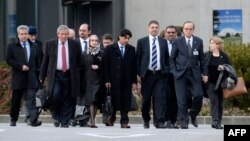GENEVA —
As the delegations from the Syrian government and opposition begin tentative talks in Geneva, attention is focusing on just who is doing the talking, and what their positions are.
The fact that the negotiators sat in the same room with a U.N. mediator Saturday was a major development after nearly three years of war, 100,000 dead and millions of Syrians displaced.
But with all the differences over issues, and even over what to talk about, some experts say the makeup of the delegations could be a key factor.
On the opposition side, the 15-member delegation was put together only a week ago, and is a compromise collection of representatives from some of the 76 groups that are not boycotting this process. Forty-four other groups refused to participate.
Alexandre Vautravers of the Geneva Center for Security Policy said this first round of talks is partly an exploration of who should represent the opposition in the future.
“There's a lot of observation with regard to these persons, these groups. How representative are they? Are they going to be able to reach some kind of consensus among themselves? I think the key is going to be the outside looking in, to try and find out who are the respectable," said Vautravers. "Legitimate parties that the international community wants to be supportive of.”
The opposition delegation chief is the president of the 120-member coalition, Ahmad al-Jarba. His ability to deviate from agreed-upon positions is limited because of the diversity of his coalition.
His chief negotiator is Hadi Barha, a U.S.-educated engineer with little political experience and no affiliation with any of the coalition groups. Other members include a former Syrian diplomat, a young geologist who lives in Britain, and several human-rights campaigners, including a woman.
Their inexperience and lack of time to get organized and finalize their positions contributed to the delay in getting the direct talks started.
The government delegation should be more cohesive and homogeneous, but there have been some indications of less than total agreement. The delegation chief, Foreign Minister Walid Moualem, gave a tough speech at the international conference that preceded these talks, but was slightly more conciliatory later.
A senior member of his delegation, Syria's U.N. Ambassador Bashar Jafari, told the BBC it is “too early” to talk about Syrian President Bashar al-Assad resigning - seemingly a departure from the official line that resignation is not even up for discussion.
Vautravers said the United States, Russia and U.N. diplomats have noticed. “The international community is really hearing out different people from the regime, from the foreign ministry, to try and find out [whether] perhaps there are some people who are closer to the possibility of opening up negotiations on the regime side,” Vautravers stated.
And that could be important because, as Jeffrey White of the Washington Institute for Near East Studies points out, this round of talks is only the beginning.
“Assuming that the negotiations and discussions don't break down completely, there'll be more rounds. There'll be Geneva 3, Geneva 4, Geneva 5 and so on, and so on, and so on. Talking is good, right? And if you can get talks going, if you can get some ongoing kinds of discussions creating a framework for further discussions, that would be good as well,” said White.
That is what the United States and Russia - the key supporters of the two sides -- want. Experts say neither the government nor the opposition would last long on the battlefields of Syria, or in the international political arena, without foreign support.
So while the members of the delegations are important, they are susceptible to outside pressure. And that may help explain how the situation changed so dramatically from Friday, when it seemed no direct talks would take place, to Saturday, when officials were talking about a full week of meetings.




